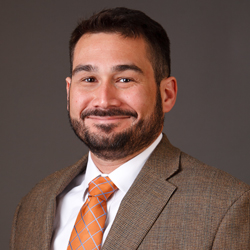To build upon the existing interest in transformative technologies and ensure that students see transportation as we do (as an exciting area for the application of next-generation and life-saving technologies), it is critical to connect with these future transportation leaders at all stages of their education and career development. Accordingly, we have designed the Safe-D to prioritize education and workforce development by both leveraging existing programs at each consortium university and creating complementary new programs with UTC support.
A key to our approach is our Education and Workforce Development Coordinator position, held by Dr. Miguel Perez, an affiliate professor in the Industrial and Systems Engineering department. As Coordinator, he 1) works with researchers to incorporate education and workforce development into all projects; 2) compiles learning materials from all projects; 3) incorporates the new materials into existing education and workforce development programs; and 4) develops and manages new education and workforce development programs.
To maximize the education and workforce development impact of the UTC research outcomes, the inclusion of an education component into each new UTC project will be a cornerstone of the Safe-D. Thus, to receive funding, a project must have an education and workforce development plan that describes what new learning materials will be produced by the project and identifies which of the Safe-D programs, either existing or new, will be targeted for educational and workforce development. Projects may also propose new educational and workforce development initiatives that complement the Safe-D educational mission.
Existing Programs Leveraged by the UTC
As all research projects funded by Safe-D are required to produce educational and workforce development materials, the UTC expects to provide content and ideas for new transportation courses and classroom modules across the consortium universities and other academic institutions interested in expanding and improving their transportation program offerings.
Non-degree programs also benefit from UTC products. This is of particular importance for two primary reasons. First, these programs have the potential to reach larger student audiences than traditional degree programs. Second, many of the existing non-degree programs are interdisciplinary in nature; thus, such programs are especially effective in increasing exposure to the transportation field for students outside of the traditional transportation degree programs. The following are notable examples of existing non-degree transportation programs within the consortium and how we expect the UTC to augment them:
- While not a formal program, the consortium members are tightly interrelated with industry and government partners. Students within the Safe-D are exposed to these partners through a variety of targeted meetings between industry reps and students and also receive assistance and recommendations from the Safe-D faculty to obtain internships and full-time employment at graduation. We will announce future opportunities to students through our social media channels and through their faculty mentors.
- The Graduate Certificate in Human Factors of Transportation Safety is currently available to VT graduate students in Statistics, Civil Engineering, Psychology, and Industrial and Systems Engineering. These students specialize in transportation safety in their coursework and research. The Safe-D promotes the certificate program, expands it to other universities as feasible, and encourages underrepresented populations to participate in this already diverse (50% female) program.
- VTTI is creating the Intern Village, which is both a program and a physical structure adjacent to VTTI’s test tracks and garages. The Intern Village will provide advanced training and practical hands-on experience to students in a variety of transportation-related areas. The UTC will bolster this initiative by funding interns who will participate in Safe-D research alongside other students and faculty across consortium universities.
- The National Science Foundation-sponsored Troops to Engineers Program at SDSU helps attract veterans into engineering careers and facilitate their transition to civilian life by providing engineering course credit for certain specialized training received in the military. The Safe-D allows SDSU to commit resources to channeling part of the Troops to Engineers program participants into transportation-related fields. The Center also works with the AggiE-Vet program at TAMU which offers similar assistance to veterans enrolling in engineering programs.
- A variety of K-12 programs, mostly STEM, reaching more than 1000 students each year, including VT’s Kids Tech University, TTI’s Advancement via Individual Determination, Project Lead the Way, and SDSU’s Mathematics Engineering Science Achievement program. The Safe-D prioritizes the development of educational modules, particularly those that are hands-on, that can be readily implemented in the K-12 curriculum to ensure that transportation science and technology become commonplace in primary education. We also make faculty, staff, and students from the Safe-D available for assisting with K-12 events and bringing transportation-themed activities to them.
Each of these existing programs benefit from the UTC program by receiving support from the Education and Workforce Development Coordinator, who reaches out to the programs, offers educational materials as they become available, and promotes the programs via websites and social media.
New Educational and Workforce Development Activities
The Safe-D seeks to add to existing education and workforce development programs by implementing original efforts to expose new (and, in many cases, non-academic) audiences to UTC research projects and students.
- Learning Modules: As a required component, all UTC projects must develop and submit at least one learning module to the education and workforce development coordinator. Each learning module will include a complete set of materials that can be incorporated into educational and workforce development programs. These modules will be organized and cataloged by the coordinator, distributed to the faculty across the consortium, and posted on our website for download.
- Seminar Series: Each of the consortium universities will host periodic visits by leaders in the transportation field to convey the new challenges and opportunities in transportation to students, faculty, and the general public. These seminars will be recorded and posted on the UTC website. We will advertise seminars through existing transportation-related student chapters at each institution (e.g., the Institute of Transportation Engineers and Woman Transportation Seminar International). These seminars will capitalize on the stature of TTI and VTTI, who routinely host potential speakers as visitors.
- Training Courses: Safe-D staff will work with each consortium partner’s continuing education office to promote the development of training courses based on the results of UTC research. To the extent possible, course structure and organization will follow National Highway Institute (NHI) standards. The Texas A&M Engineering Extension Service offers multiple highway safety courses to government and contractor staff and has experienced adult education specialists to assist in course development.
- USA Science & Engineering Festival Exhibit This four-day biennial festival, held in the Spring in Washington, DC, brings together over 350,000 children and parents, including many minorities. The consortium partners will develop an exhibit for this festival to introduce children to new developments in transportation safety and technology.
In addition to the above initiatives, we encourage the submission of novel education and workforce development ideas for all ages as part of the competitive award process or through direct contact with the Education and Workforce Development Coordinator.
Education and Workforce Development Coordinator

Miguel Perez
- 540-231-1537
- mperez@vtti.vt.edu
